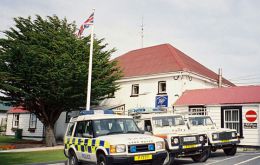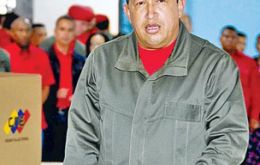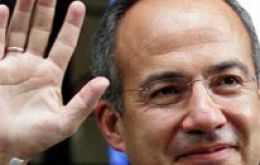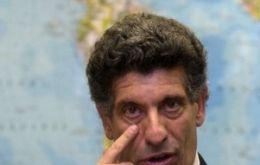MercoPress. South Atlantic News Agency
Politics
-
Wednesday, November 26th 2008 - 20:00 UTC
Cocaine haul vanishes from Falklands' police station

Nearly one million pounds worth of cocaine has been stolen from Stanley Police Station in the Falkland Islands, reported the local government.
-
Wednesday, November 26th 2008 - 20:00 UTC
British ID cards become mandatory for foreign nationals

The British government began its identity card program for foreign nationals this week, six years after heated debate over whether the costly plan is an effective tool against terrorism, identity theft and welfare fraud.
-
Wednesday, November 26th 2008 - 20:00 UTC
HMS Iron Duke Falklands South Georgia safe passage

The Royal Navy's South Atlantic patrol HMS Iron Duke, accompanied by RFA Black Rover, has successfully navigated large icebergs in the Antarctic Convergence Zone to make a safe passage from the Falkland Islands to South Georgia.
-
Wednesday, November 26th 2008 - 20:00 UTC
Police “repression” again fashionable for Uruguay's gov.

Crime, law and order, have moved to the centre of Uruguay's public debate following several cases of small shop keepers shooting and killing in self defence or in defence of their families threatened at gun point in their premises.
-
Tuesday, November 25th 2008 - 20:00 UTC
Medvedev in Latam visit to revive “privileged” ties

Russia is seeking to revive “privileged” ties with Latin America, which had been neglected after the collapse of the Soviet Union, Russian President Dmitry Medvedev said Monday on leaving Peru.
-
Tuesday, November 25th 2008 - 20:00 UTC
Uruguay/Argentina ready for next diplomatic clash

Chile's Foreign Affairs minister Alejandro Foxley said that former president Nestor Kirchner remains the leading candidate to become Secretary General of the Union of South American Nations, Unasur, although admitting a consensus must be reached among country members.
-
Monday, November 24th 2008 - 20:00 UTC
Venezuela elections: Chavez opponents make poll gains

Venezuela's opposition has made gains in regional polls, but President Hugo Chavez's allies have held onto at least 17 of the country's 22 governorships.
-
Monday, November 24th 2008 - 20:00 UTC
Mexican leader in Bs As to sign strategic association

Mexican president Felipe Calderón arrived in Buenos Aires late Sunday for a two-day official visit, during which he and President Cristina Fernández de Kirchner will make the first steps in the Strategic Association deal signed by the countries last year.
-
Monday, November 24th 2008 - 20:00 UTC
Chilean, Argentine naval forces parade in Punta Arenas

A joint parade of Argentine and Chilean naval schools graduates took place Sunday in Punta Arenas Main Square followed by a march along the city's streets, the first time ever of such an event.
-
Monday, November 24th 2008 - 20:00 UTC
Skeptic outlook about Mercosur in current circumstances

The president of the Standing Committee of Mercosur representatives said he feels frustrated with the workings of the South American trade group and proposes drastic changes since in the current global circumstances integration advances in the region could even turn negative.
